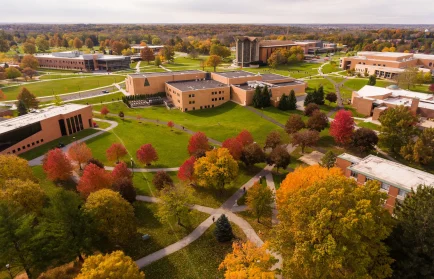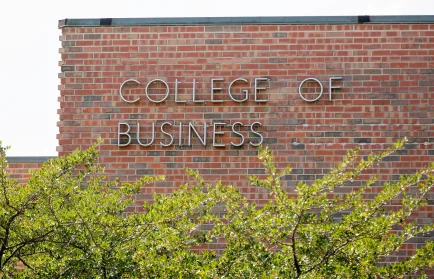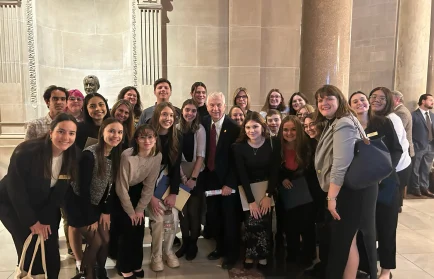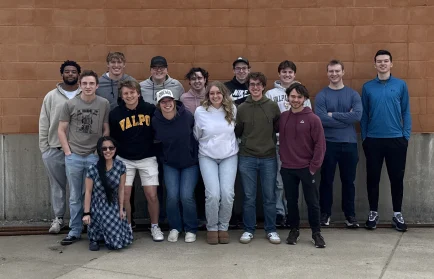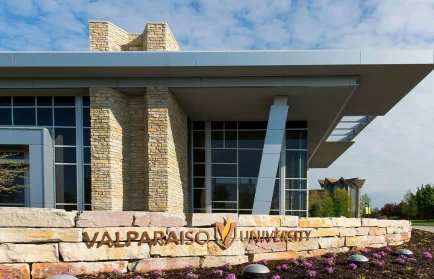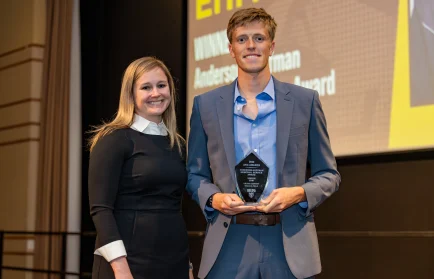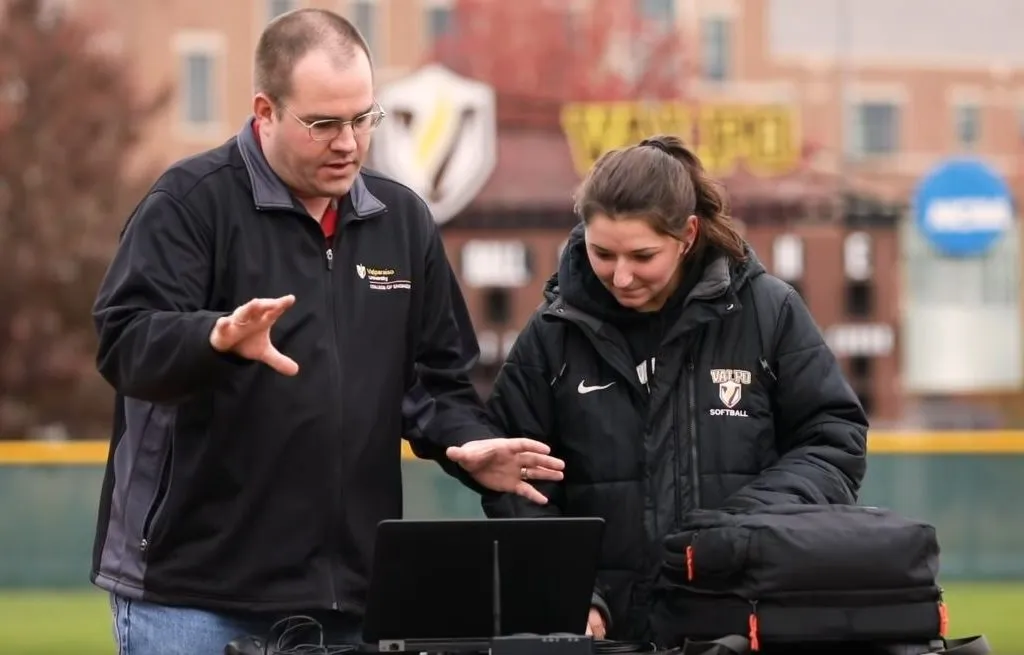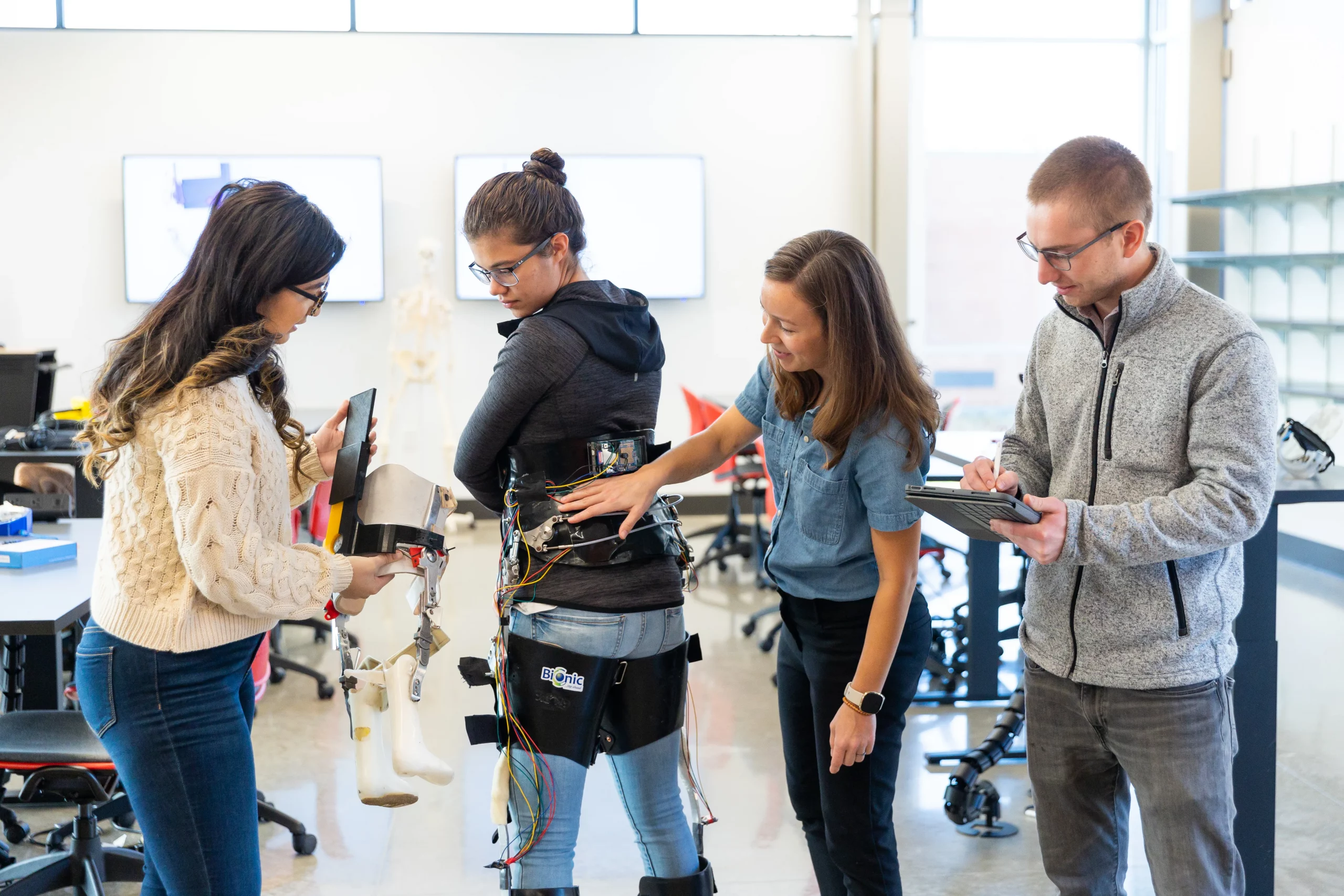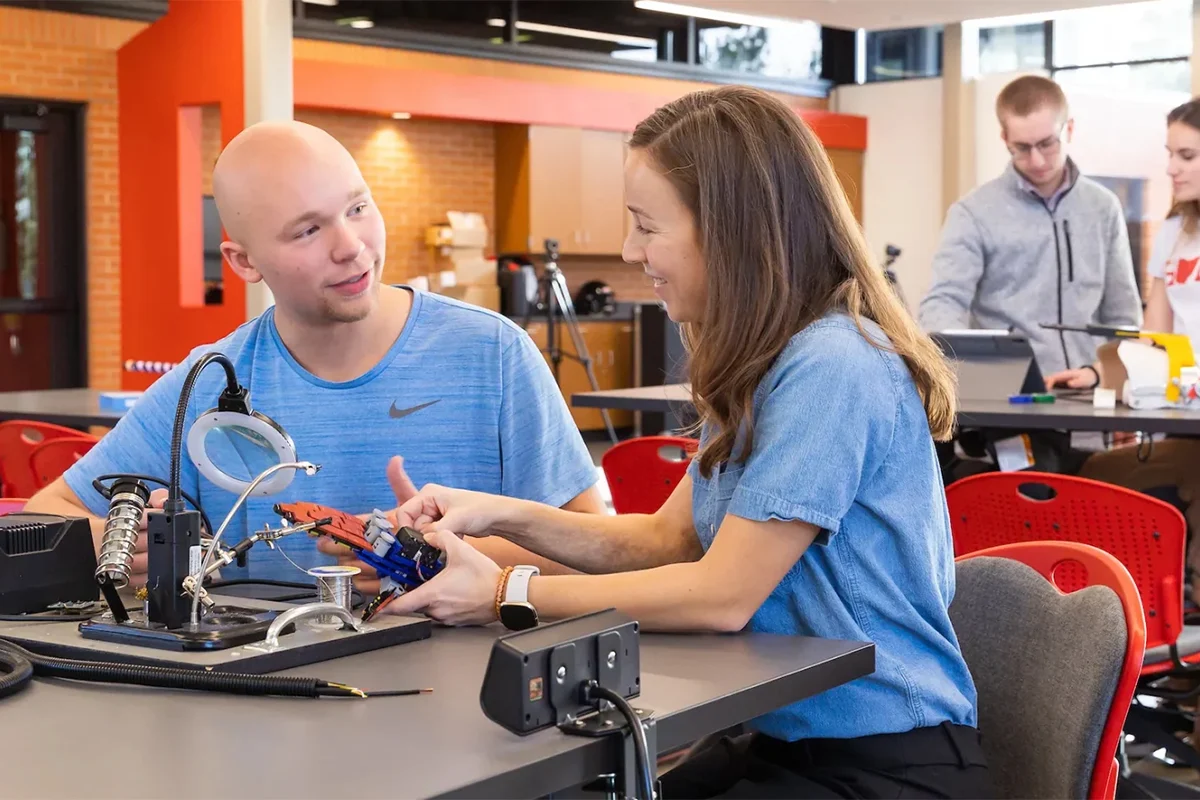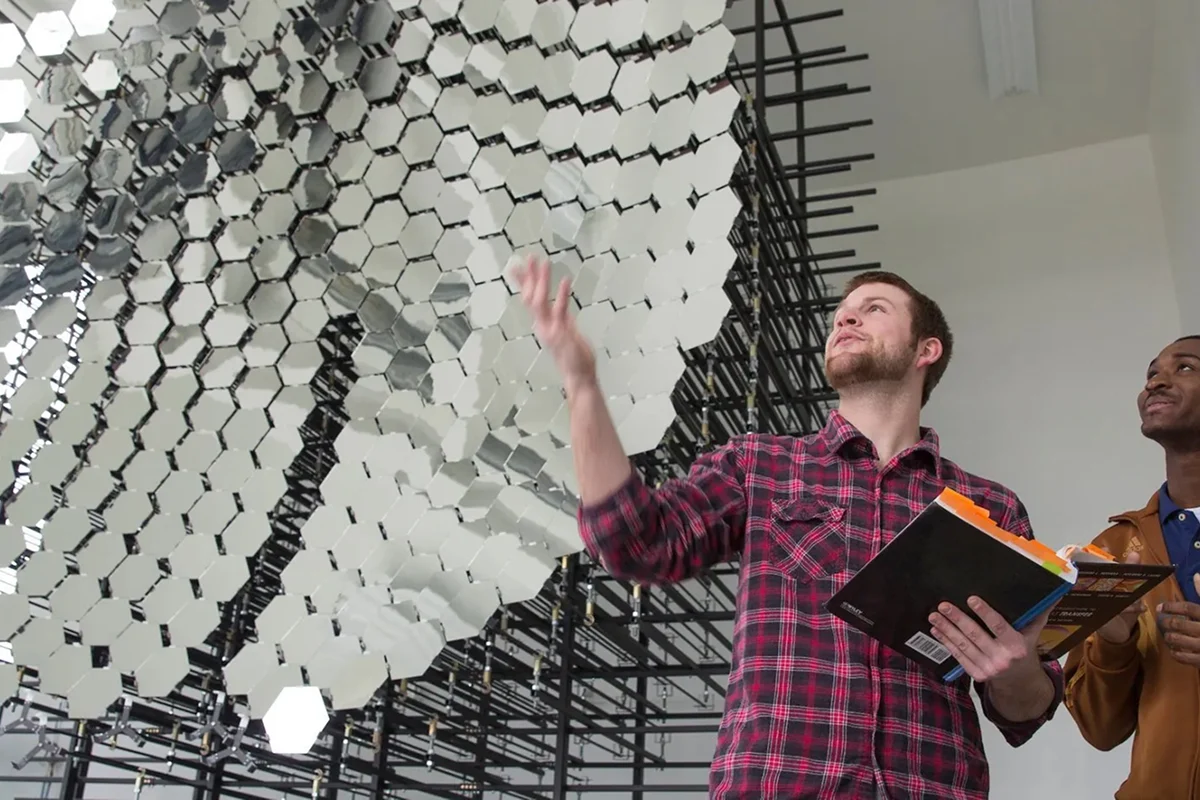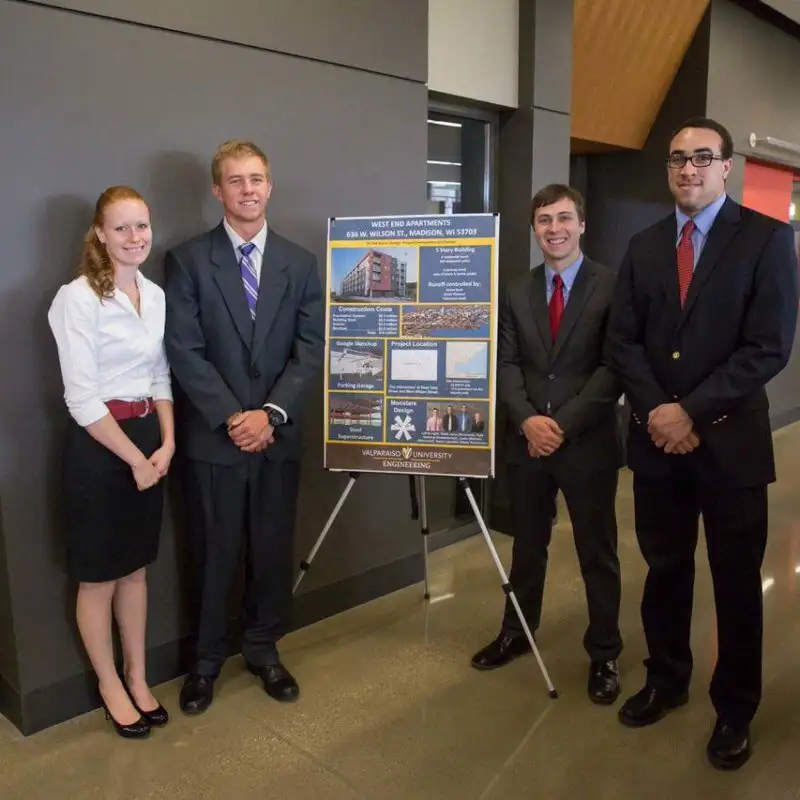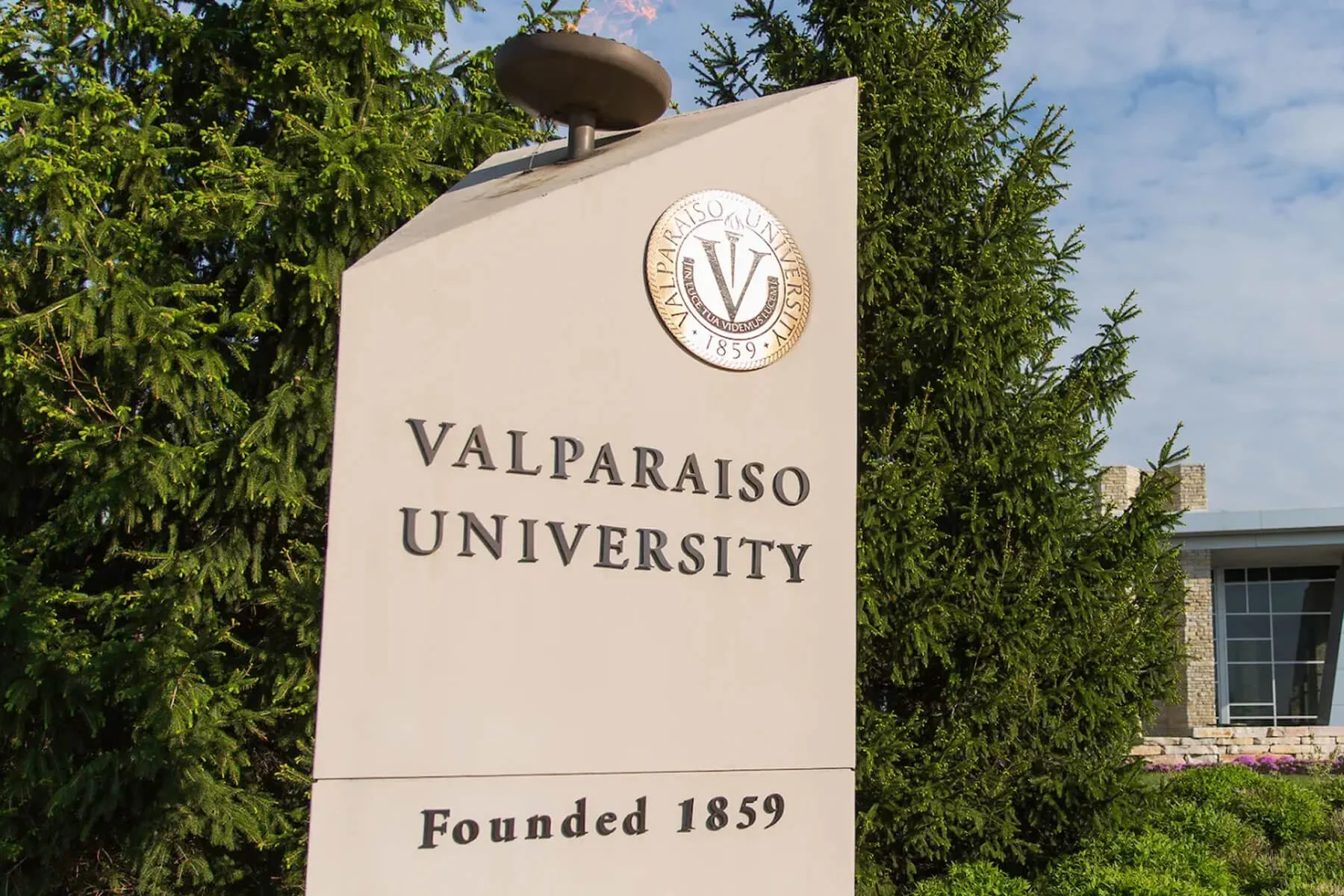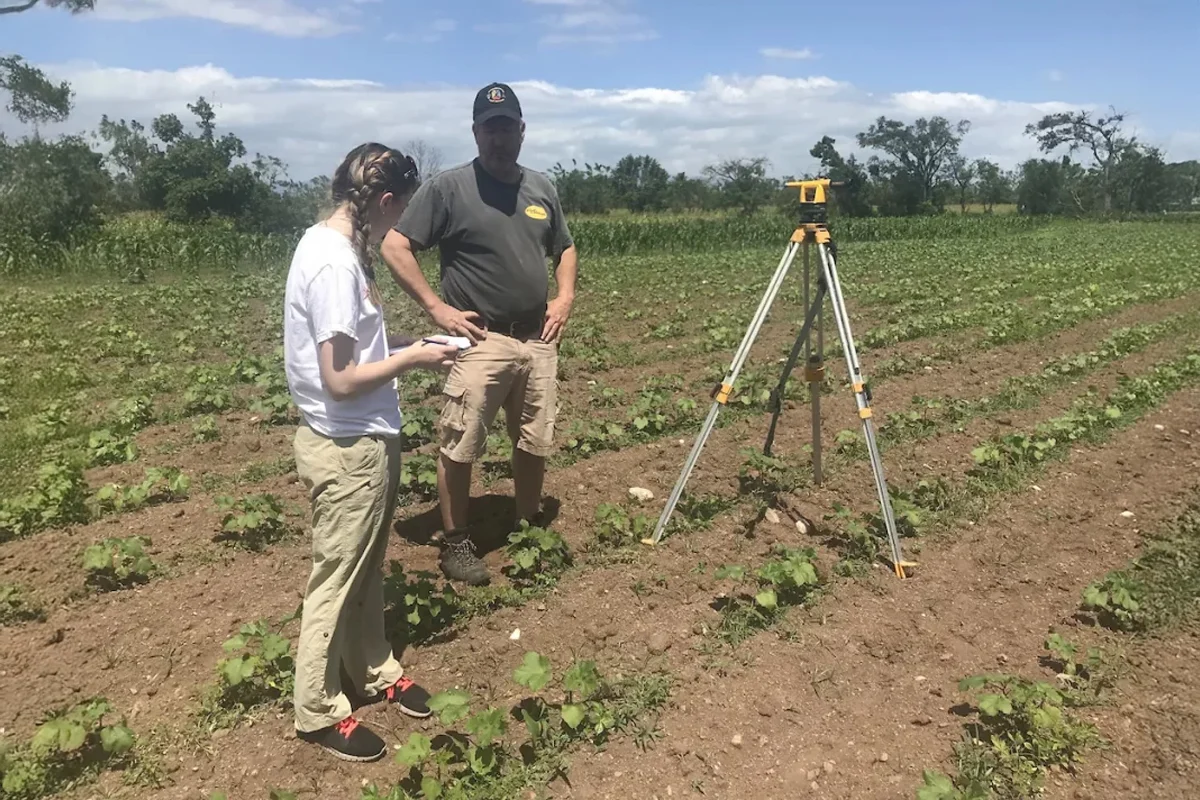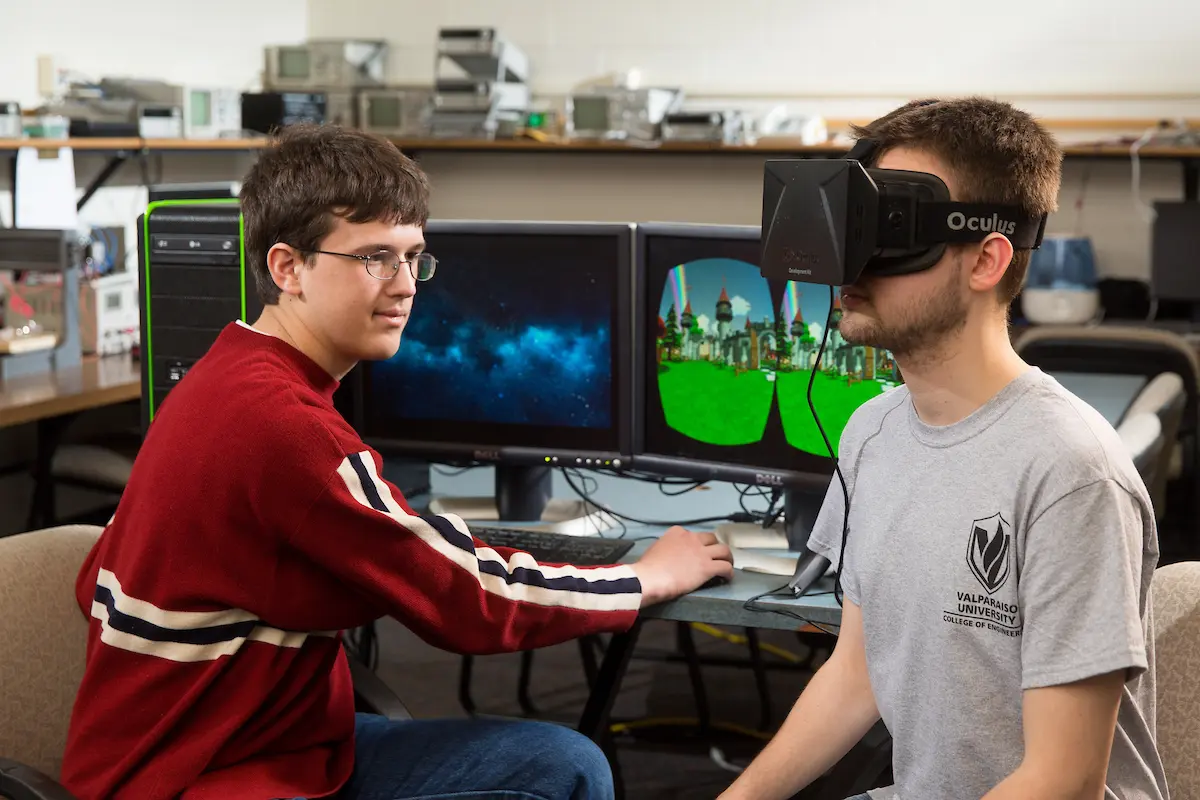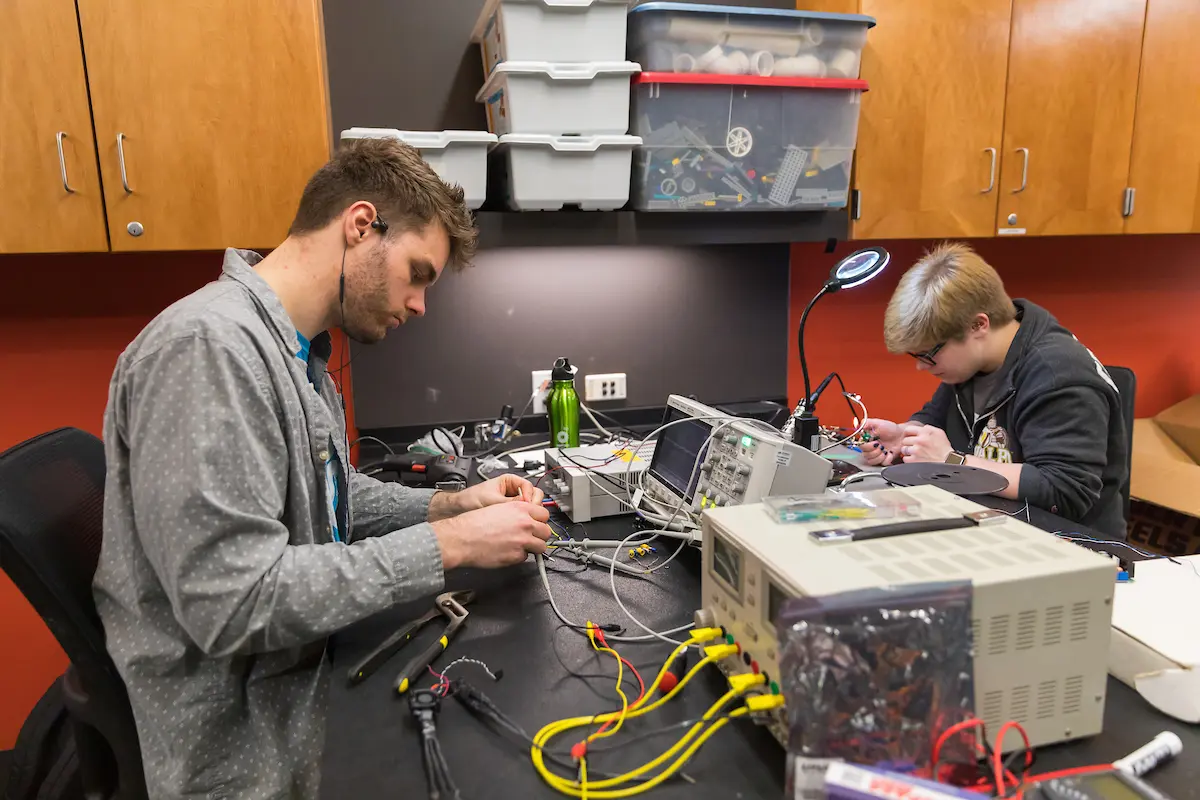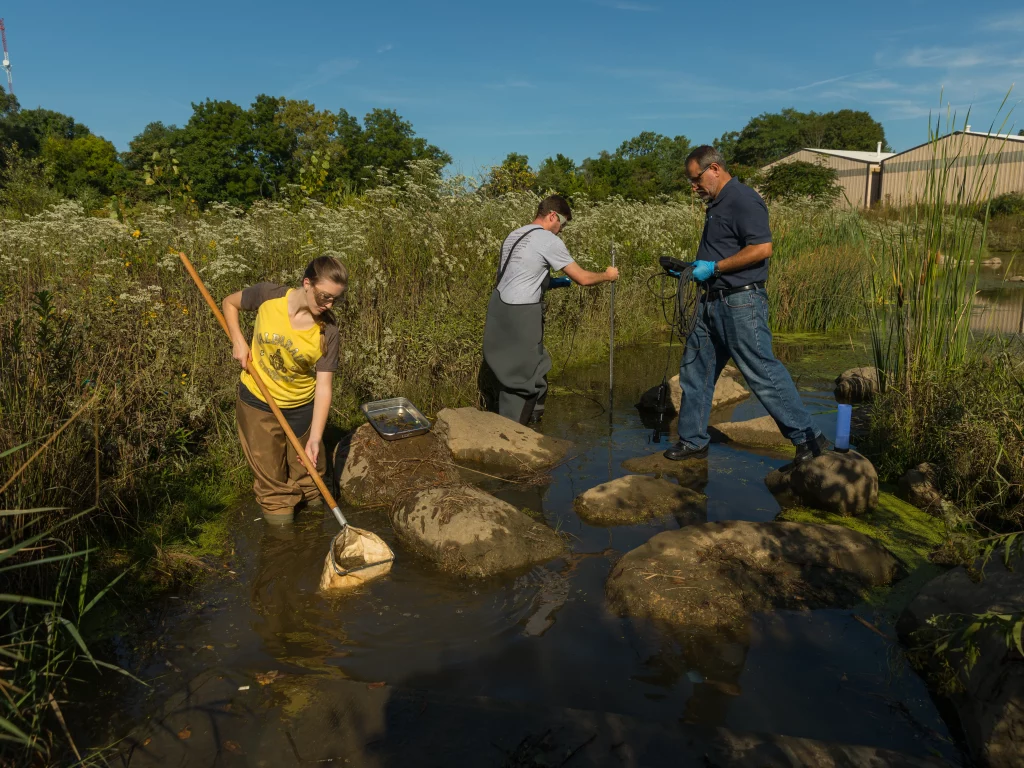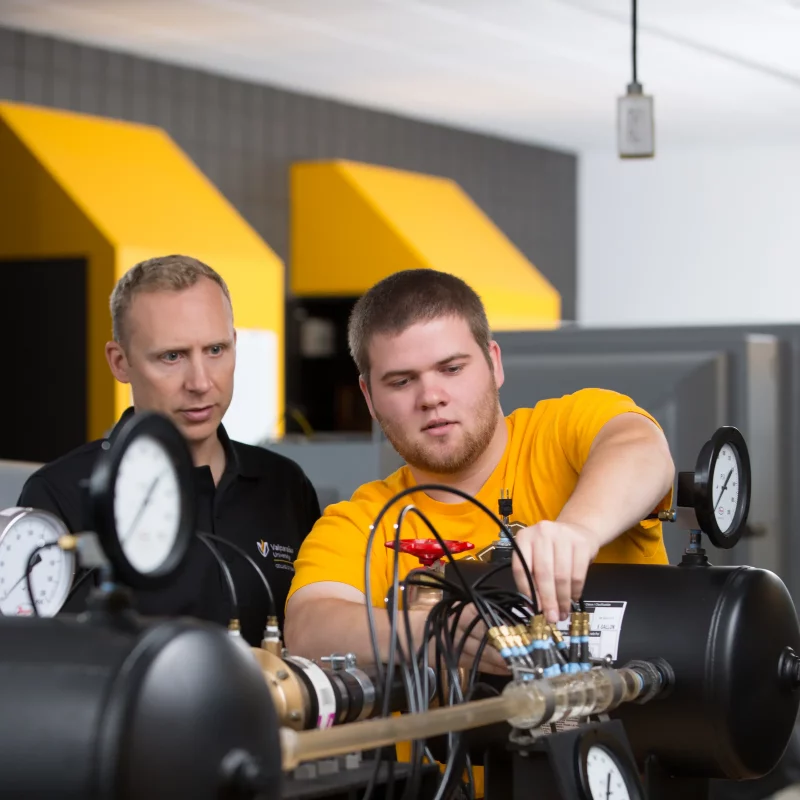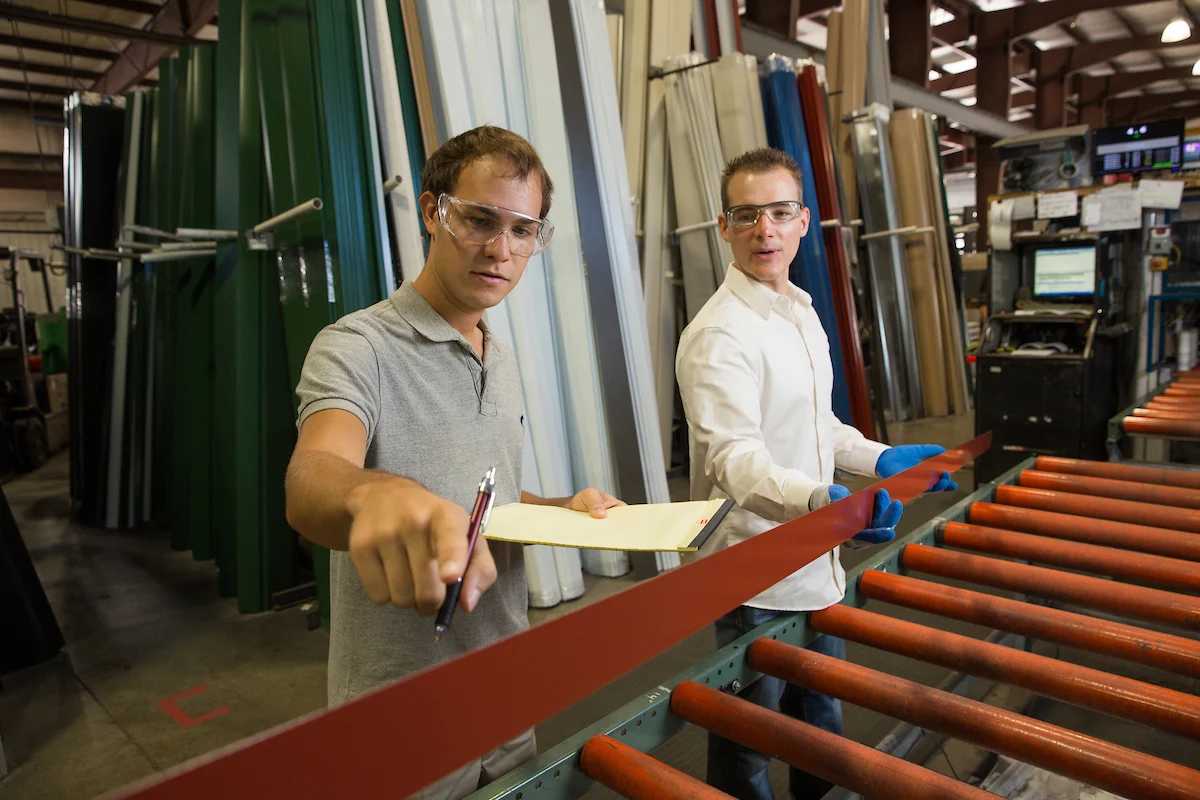Bioengineering
At the College of Engineering at Valpo, bioengineering students learn about improving the lives of others by combining principles of engineering and physiological knowledge.
About Our Bioengineering Degrees
The Bioengineering program is accredited by the Engineering Accreditation Commission of ABET.
Mission
The Department of Mechanical Engineering and Bioengineering provides a program of professional study grounded in engineering fundamentals and arts and sciences augmented by the development of interpersonal skills, experiential learning, and an appreciation of life-long learning. Graduates are prepared to apply their knowledge to society’s needs and help shape the future.
BE Program Educational Objectives
Student Outcomes describe what students pursuing a bioengineering bachelor’s degree are expected to know and be able to do by the time of graduation. These relate to the skills, knowledge, and behaviors that students acquire as they progress through the program. The Student Outcomes help to direct and measure the success of the Bioengineering Program in accomplishing its mission. Review of the Student Outcomes is an integral part of the annual assessment process.
Program Educational Objectives are broad statements that describe what graduates are expected to attain within a few years of graduation. They are based on the needs of the program’s constituencies. The Program Educational Objectives help to direct and measure the success of the Bioengineering Program in accomplishing its mission. Review of the Educational Objectives is an integral part of the annual assessment process.
Within a few years of graduation, bioengineering graduates will be expected to:
- Have a vocation.
- Demonstrate growth or advancement in their chosen vocation.
- Serve society through their endeavors in their chosen vocation.
- Lead society in through their endeavors in their chosen vocation.
Student Outcomes
Upon successful completion of the Bioengineering Program, graduates will have:
- an ability to identify, formulate, and solve complex engineering problems by applying principles of engineering, science, and mathematics
- an ability to apply engineering design to produce solutions that meet specified needs with consideration of public health, safety, and welfare, as well as global, cultural, social, environmental, and economic factors
- an ability to communicate effectively with a range of audiences
- an ability to recognize ethical and professional responsibilities in engineering situations and make informed judgments, which must consider the impact of engineering solutions in global, economic, environmental, and societal context
- an ability to function effectively on a team whose members together provide leadership, create a collaborative and inclusive environment, establish goals, plan tasks, and meet objectives
- an ability to develop and conduct appropriate experimentation, analyze and interpret data, and use engineering judgment to draw conclusions
- An ability to acquire and apply new knowledge as needed, using appropriate learning strategies
- Additionally, the structure of the curriculum must provide both breadth and depth across the range of engineering and science topics consistent with the program educational objectives and student outcomes. The curriculum must prepare graduates with experience in:
- (a) Applying principles of engineering, biology, human physiology, chemistry, calculus-based physics, mathematics (through differential equations) and statistics
- (b) Solving bio/biomedical engineering problems, including those associated with the interaction between living and non-living systems
- (c) Analyzing, modeling, designing, and realizing bio/biomedical engineering devices, systems, components, or processes
- (d) Making measurements on and interpreting data from living systems
Enrollment and Graduation Data
The College of Engineering tracks its enrollment and graduation data, click the link below to view our data over the past five years.
Course Pathways
| Semester 1 | |
|---|---|
| GE 100 Fundamentals of Engineering | 2 Cr. |
| CORE 110 The Human Experience | 4 Cr. |
| MATH 131 Analytic Geom. & Calc. I | 4 Cr. |
| PHYS 141 Newtonian Mechanics | 3 Cr. |
| PHYS 141L Experimental Physics I | 1 Cr. |
| KIN 101 Wellness and Stress | 1 Cr. |
| Semester 2 | |
|---|---|
| ME 102 Computer-Aided Design | 1 Cr. |
| ME 125 Computer Prog. for Mech. Eng. | 1 Cr. |
| GE 109 Mechanics-Statics | 3 Cr. |
| MATH 132 Calculus II | 4 Cr. |
| PHYS 142 Physics: II E&M | 3 Cr. |
| CORE 115 The Human Experience | 4 Cr. |
| Semester 3 | |
|---|---|
| ME 209 Mechanics-Dynamics | 3 Cr. |
| ECE 281 Fundamentals of Electrical Eng. | 2.5 Cr. |
| BIO 151 Anatomy and Physiology I (lab) | 4 Cr. |
| MATH 253 Calc. III | 4 Cr. |
| ME 201 Technical Writing | 1 Cr. |
| CHEM 115 Chemistry (lab) | 4 Cr. |
| Semester 4 | |
|---|---|
| MATH 260 Linear Systems and Matrices | 1 Cr. |
| MATH 270 Ordinary Diff. Equations | 3 Cr. |
| STAT 240 Statistical Analysis | 3 Cr. |
| BIO 152 Anatomy and Physiology II (lab) | 4 Cr. |
| ME 215 Mechanics of Materials | 3 Cr. |
| ME 261 Analog Circuits Laboratory | 0.5 Cr. |
| Semester 5 | |
|---|---|
| BE 317 Sustainable Engineering | 2 Cr. |
| ME 333 Measurements (lecture and lab) | 4 Cr. |
| ME 355 Sys. Maeling and Num. Methods | 3 Cr. |
| ME 373 Fluid Mechanics | 3 Cr. |
| GE 311 Financial Decisions in Engr. | 1.5 Cr. |
| GE 312 Ethical Decisions in Engr. | 1.5 Cr. |
| Semester 6 | |
|---|---|
| BE 320 Bioengineering Tech Lab | 1 Cr. |
| BE 340 Bioelectricity | 3 Cr. |
| BE 369 Biomechanics | 3 Cr. |
| ME 252 Materials Science | 2.5 Cr. |
| ME 270 Thermodynamics I | 3 Cr. |
| BE Technical Elective | 3 Cr. |
| Semester 7 | |
|---|---|
| GE 497 Sr. Design Proj. I | 3 Cr. |
| ME 352 Mat. Science & Mechanics Lab | 0.5 Cr. |
| ME 442 Automatic Control | 3 Cr. |
| BE 415 Biomaterials | 3 Cr. |
| BE Technical Elective | 3 Cr. |
| THEO 200 The Christian Tradition | 3 Cr. |
| Semester 8 | |
|---|---|
| GE 498 Senior Design Project II | 3 Cr. |
| ME 376 Heat Transfer | 3 Cr. |
| BE Technical Elective | 1 Cr. |
| Hum., Soc. Science, Theo. Elective | 3 Cr. |
| Hum., Soc. Science, Theo. Elective | 3 Cr. |
| World Lang./ Diversity Elective | 3 Cr. |
| Total credits required for graduation= | 126 Cr. |
Electives
Writing Intensive Course (as indicated by a superscript “w”): At least one course taken to satisfy the World Languages/Diversity Elective, Humanities, Social Science, and Theology Electives, THEO 200: The Christian Tradition, or ME 201 must be a Writing Intensive Course. List of approved Writing Intensive Courses
Cooperative Education: GE 481 through GE 483 may be used to satisfy the Professional Electives requirement. All courses are graded S/U only.
Humanities, Social Science, Theology Electives: Students may take six credits from the approved list of Humanities courses, Social Science courses, or Theology courses. Courses may be from the same area or from different areas. List of approved Humanities, Social Science, Theology Electives
MCAT Preparation: Students participating in the Biomedical Track that wish to take the Medical College Admission Test (MCAT) should take SOC 110 Introduction to Sociology (3 credits that count towards Humanities, Social Science, Theology Electives) and PSY 110 General Psychology (3 credits).
Bioengineering Electives: Additional bioengineering and mechanical engineering courses are to be selected to provide areas of individual study emphasis from the following courses: BE 200, 468, ME 253, 353, 361, 363, 364, 365, 366, 367, 368, 369, 374, 405, 452, 453, 455, 456, 457, 467, and multiple sections of ME 490 or BE 490. Other courses may be used to satisfy this elective with the approval of the department faculty. Up to three credits may be substituted for students taking an approved second technical major or an approved technical minor. Only three hours of BE 499 or ME 499course credits may be applied as a BE elective. Courses which fulfill mechanical engineering elective requirements are indicated with a superscript “b”(…)b.
Computer Specifications: When looking for a computer to use for engineering classes, click here for the specifications.
| Semester 1 | |
|---|---|
| GE 100 Fundamentals of Engineering | 2 Cr. |
| CORE 110 The Human Experience | 4 Cr. |
| MATH 131 Analytic Geom. & Calc. I | 4 Cr. |
| PHYS 141/L Newtonian Mechanics | 4 Cr. |
| KIN 101 Wellness and Stress | 1 Cr. |
| Semester 2 | |
|---|---|
| ME 102 Computer-Aided Design | 1 Cr. |
| ME 125 Computer Prog. for Mech. Eng | 1 Cr. |
| GE 109 Mechanics-Statics | 3 Cr. |
| MATH 132 Calculus II | 4 Cr. |
| PHYS 142 Physics: II E&M | 3 Cr. |
| CORE 115 The Human Experience | 4 Cr. |
| Semester 3 | |
|---|---|
| MATH 253 Calculus III | 4 Cr. |
| BIO 151 Anatomy and Physiology (lab) | 4 Cr. |
| CHEM 115 Chemistry | 4 Cr. |
| ECE 281 Fundamentals of Electrical Eng. | 2.5 Cr. |
| ME 201 Technical Writing for ME | 1 Cr. |
| ME 209 Mechanics-Dynamics | 3 Cr. |
| Semester 4 | |
|---|---|
| MATH 260 Linear Algebra | 1 Cr. |
| MATH 270 Differential Equations | 3 Cr. |
| STAT 240 Statistical Analysis | 3 Cr. |
| BIO 152 Anatomy and Physiology II (lab) | 4 Cr. |
| ME 261 Analog Circuits Lab | 0.5 Cr. |
| Hum., Soc. Science, Theo. Elective | 3 Cr. |
| Semester 5 | |
|---|---|
| ECE 221 Digital Logic Design | 3 Cr. |
| ECE 251 Engineering Programming I | 3 Cr. |
| BE 317 Sustainable Engineering | 2 Cr. |
| ME 333 Measurements (leacture & lab) | 4 Cr. |
| ME 355 Sys. Modeling & Num. Methods | 3 Cr. |
| Semester 6 | |
|---|---|
| BE 320 Bioengineering Tech. Lab | 1 Cr. |
| BE 340 Bioelectricity | 3 Cr. |
| BE 369 Biomechanics | 3 Cr. |
| ME 252 Materials Science | 2.5 Cr. |
| GE 311 Financial Decisions in Engr. | 1.5 Cr. |
| GE 312 Ethical Decisions in Engr. | 1.5 Cr. |
| BE Technical Elective | 3 Cr. |
| Semester 7 | |
|---|---|
| BE 415 Biomaterials | 3 Cr. |
| ME 352 Materials Science & Mech. Lab | 0.5 Cr. |
| ECE 322 Embedded Microcontrollers | 3 Cr. |
| ECE 360 Signals and Systems | 3 Cr. |
| GE 497 Sr. Design Proj. I | 3 Cr. |
| THEO 200 The Christian Tradition | 3 Cr. |
| Semester 8 | |
|---|---|
| GE 498 Senior Design Project II | 3 Cr. |
| World Language/ Diversity Elective | 3 Cr. |
| Hum., Soc. Science, Theo. Elective | 3 Cr. |
| ECE 452 Digital Signal Processing | 3 Cr. |
| BE Technical Elective | 4 Cr. |
| Total credits required for graduation | 126 Cr. |
Electives
Writing Intensive Course (as indicated by a superscript “w”): At least one course taken to satisfy the World Languages/Diversity Elective, Humanities, Social Science, and Theology Electives, THEO 200: The Christian Tradition, or ME 201 must be a Writing Intensive Course. List of approved Writing Intensive Courses
Cooperative Education: GE 481 through GE 483 may be used to satisfy the Professional Electives requirement. All courses are graded S/U only.
Humanities, Social Science, Theology Electives: Students may take six credits from the approved list of Humanities courses, Social Science courses, or Theology courses. Courses may be from the same area or from different areas. List of approved Humanities, Social Science, Theology Electives
MCAT Preparation: Students participating in the Biomedical Track that wish to take the Medical College Admission Test (MCAT) should take SOC 110 Introduction to Sociology (3 credits that count towards Humanities, Social Science, Theology Electives) and PSY 110 General Psychology (3 credits).
Bioengineering Electives: Additional bioengineering and mechanical engineering courses are to be selected to provide areas of individual study emphasis from the following courses: BE 200, 468, ME 253, 353, 361, 363, 364, 365, 366, 367, 368, 369, 374, 405, 452, 453, 455, 456, 457, 467, and multiple sections of ME 490 or BE 490. Other courses may be used to satisfy this elective with the approval of the department faculty. Up to three credits may be substituted for students taking an approved second technical major or an approved technical minor. Only three hours of BE 499 or ME 499course credits may be applied as a BE elective. Courses which fulfill mechanical engineering elective requirements are indicated with a superscript “b”(…)b.
Computer Specifications: When looking for a computer to use for engineering classes, click here for the specifications.
| Semester 1 | |
|---|---|
| GE 100 Fundamentals of Engineering | 2 Cr. |
| CORE 110 The Human Experience | 4 Cr. |
| MATH 131 Analytic Geom. & Calc. I | 4 Cr. |
| PHYS 141/L Newtonian Mechanics | 4 Cr. |
| KIN 101 Wellness and Stress | 1 Cr. |
| Semester 2 | |
|---|---|
| ME 102 Computer-Aided Design | 1 Cr. |
| ME 125 Comp. Prog. for Mech. Eng | 1 Cr. |
| GE 109 Mechanics-Statics | 3 Cr. |
| MATH 132 Calculus II | 4 Cr. |
| PHYS 142 Physics: II E&M | 3 Cr. |
| CORE 115 The Human Experience | 4 Cr. |
| Semester 3 | |
|---|---|
| MATH 253 Calculus III | 4 Cr. |
| BIO 151 Anatomy & Physiology I | 4 Cr. |
| ECE 281 Fundamentals of Electrical Eng. | 2.5 Cr. |
| CHEM 121 General Chemistry I (lab) | 4 Cr. |
| ME 201 Technical Writing for ME | 1 Cr. |
| ME 209 Mechanics-Dynamics | 3 Cr. |
| Semester 4 | |
|---|---|
| MATH 260 Lin. Systems & Matrices | 1 Cr. |
| MATH 270 Differential Equations | 3 Cr. |
| CHEM 122 General Chem. II (lab) | 4 Cr. |
| BIO 151 Anatomy & Physiology II | 4 Cr. |
| STAT 240 Statistical Analysis | 3 Cr. |
| ME 261 Analog Circuits Laboratory | 0.5 Cr. |
| Semester 5 | |
|---|---|
| BE 317 Sustainable Engineering | 2 Cr. |
| ME 333 Measurements (lab) | 4 Cr. |
| ME 355 Sys. Modeling & Num. Methods | 3 Cr. |
| CHEM 221 Organic Chemistry I (lab) | 4 Cr. |
| GE 311 Financial Decisions in Engr. | 1.5 Cr. |
| GE 312 Ethical Decisions in Engr. | 1.5 Cr. |
| Semester 6 | |
|---|---|
| BE 320 Bioengineering Tech. Lab | 1 Cr. |
| BE 340 Bioelectricity | 3 Cr. |
| BE 369 Biomechanics | 3 Cr. |
| CHEM 222 Organic Chemistry II (lab) | 4 Cr. |
| ME 252 Materials Science | 2.5 Cr. |
| ME 270 Thermodynamics I | 3 Cr. |
| Semester 7 | |
|---|---|
| GE 497 Sr. Design Proj. I | 3 Cr. |
| BE 415 Biomaterials | 3 Cr. |
| ME 352 Material Science & Mech. Lab | 0.5 Cr. |
| Bioengineering Technical Elective | 3 Cr. |
| Hum., Soc. Science, Theo. Electives | 6 Cr. |
| Semester 8 | |
|---|---|
| GE 498 Senior Design Project II | 3 Cr. |
| World Language/ Diversity Elective | 3 Cr. |
| THEO 200 The Christian Tradition | 3 Cr. |
| BE Technical Electives | 3 Cr. |
| Total credits required for graduation: | 126 Cr. |
Electives
Writing Intensive Course (as indicated by a superscript “w”): At least one course taken to satisfy the World Languages/Diversity Elective, Humanities, Social Science, and Theology Electives, THEO 200: The Christian Tradition, or ME 201 must be a Writing Intensive Course. List of approved Writing Intensive Courses
Cooperative Education: GE 481 through GE 483 may be used to satisfy the Professional Electives requirement. All courses are graded S/U only.
Humanities, Social Science, Theology Electives: Students may take six credits from the approved list of Humanities courses, Social Science courses, or Theology courses. Courses may be from the same area or from different areas. List of approved Humanities, Social Science, Theology Electives
MCAT Preparation: Students participating in the Biomedical Track that wish to take the Medical College Admission Test (MCAT) should take SOC 110 Introduction to Sociology (3 credits that count towards Humanities, Social Science, Theology Electives) and PSY 110 General Psychology (3 credits).
Bioengineering Electives: Additional bioengineering and mechanical engineering courses are to be selected to provide areas of individual study emphasis from the following courses: BE 200, 468, ME 253, 353, 361, 363, 364, 365, 366, 367, 368, 369, 374, 405, 452, 453, 455, 456, 457, 467, and multiple sections of ME 490 or BE 490. Other courses may be used to satisfy this elective with the approval of the department faculty. Up to three credits may be substituted for students taking an approved second technical major or an approved technical minor. Only three hours of BE 499 or ME 499course credits may be applied as a BE elective. Courses which fulfill mechanical engineering elective requirements are indicated with a superscript “b”(…)b.
Computer Specifications: When looking for a computer to use for engineering classes, click here for the specifications.
Bioengineering Minor
The purpose of the biomedical engineering minor is to expose Valpo students to a broad and exciting field aimed at improving the lives of others. The minor works well with the mechanical engineering curriculum and essentially directs students in their choices of elective courses while working toward graduation. However, the required courses can be completed by any student that has the necessary background and prerequisites in math and physics.
The focus of the biomedical engineering electives will be dictated by the expertise of each individual faculty member. One semester students might learn about the electrical signals the nervous system conveys to various muscles, and the next semester those students might learn about how to design prosthetic limbs and control them with existing anatomical inputs. Students who complete this 18 credit minor will graduate prepared to pursue graduate school or industrial jobs in one of the many applications of biomedical engineering, such as designing implants, medical devices, or prosthetics/orthotics.
Current research being performed in the Human Movement Research Laboratory in Gellersen falls under three main projects:
- the analysis of gait while wearing different running shoes (four current engineering students),
- the design and control of a prosthetic arm (three current engineering students),
- and the development of a statistical metric that will be used to indicate when an athlete is on the verge of an injury (nine current engineering students and five current kinesiology students).
These studies are supported by state-of-the-art equipment that allows researchers to track people in motion using motion-capture cameras, record muscle activity using electromyogram (EMG) sensors, and study impact loads using in-sole pressure maps. These research projects have helped the College of Engineering send two students to the annual American Society of Biomechanics Conference in 2011, two students to the American Society of Mechanical Engineers 2012 Summer Bioengineering Conference, five students to the American Society of Mechanical Engineers 2013 Summer Bioengineering Conference, and six students to the World Congress of Biomechanics in 2014.
College of Engineering
Program Rankings & Highlights
Bioengineering Research
A significant component of studying at Valparaiso University’s College of Engineering is the collaboration with knowledgeable faculty. Students have the opportunity to be mentored by and work along side renowned experts on research.
Discover, Learn and Create
Meet Our Faculty
Professors. Mentors. Friends. At Valparaiso University, you will work on real-life problems alongside faculty leaders with decades of business experience and a true desire to do what’s best for you.
College of Engineering
